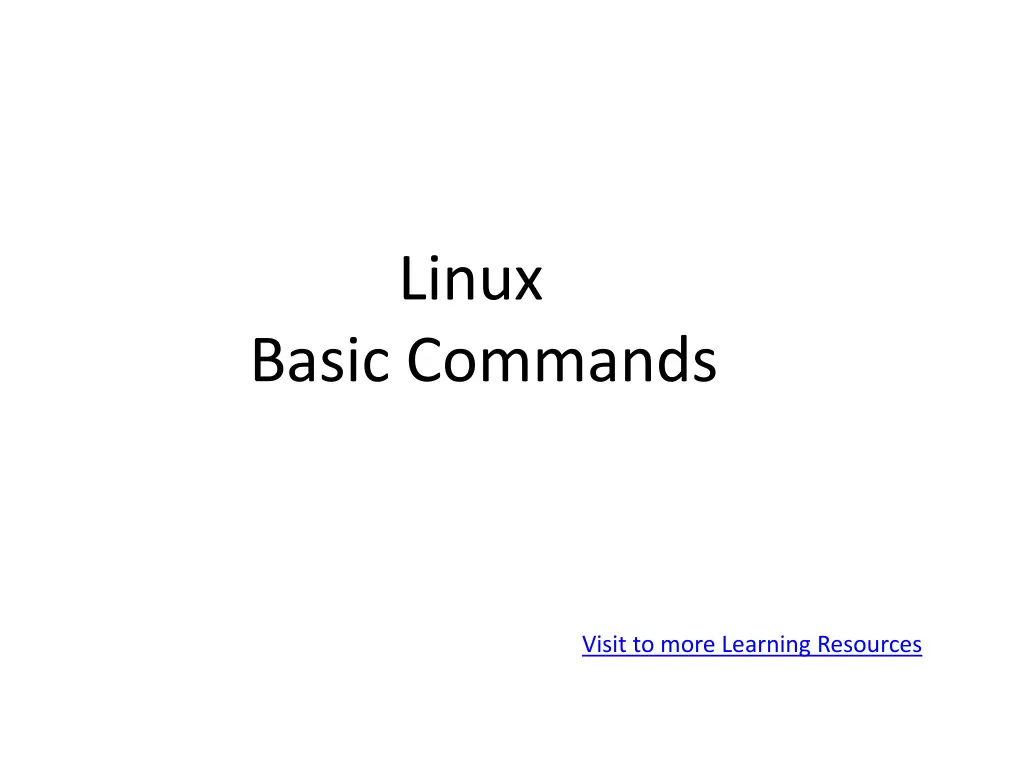
Master Basic Linux Commands for Efficient System Management
"Enhance your Linux skills with this comprehensive guide on basic command line operations such as file handling, text processing, system administration, and more. Explore essential commands like mkdir, ls, cd, vim, cp, mv, rm, find, history, patterns, cat, echo, and grep for effective usage. Level up your command-line proficiency for better resource management and process handling in Linux environments."
Download Presentation

Please find below an Image/Link to download the presentation.
The content on the website is provided AS IS for your information and personal use only. It may not be sold, licensed, or shared on other websites without obtaining consent from the author. If you encounter any issues during the download, it is possible that the publisher has removed the file from their server.
You are allowed to download the files provided on this website for personal or commercial use, subject to the condition that they are used lawfully. All files are the property of their respective owners.
The content on the website is provided AS IS for your information and personal use only. It may not be sold, licensed, or shared on other websites without obtaining consent from the author.
E N D
Presentation Transcript
Linux Basic Commands Visit to more Learning Resources
Basic Linux Commands File Handling Text Processing System Administration Process Management Archival File Systems Advanced Commands
File Handling commands mkdir make directories Usage: mkdir [OPTION] DIRECTORY... eg. mkdir prabhat ls list directory contents Usage: ls [OPTION]... [FILE]... eg. ls, ls -l, ls prabhat cd changes directories Usage: cd [DIRECTORY] eg. cd prabhat
File Handling(contd...) pwd print name of current working directory Usage: pwd vim Vi Improved, a programmers text editor Usage: vim [OPTION] [file]... eg. vim file1.txt
File Handling(contd...) cp copy files and directories Usage: cp [OPTION]... SOURCE DEST eg. cp sample.txt sample_copy.txt cp sample_copy.txt target_dir mv move (rename) files Usage: mv [OPTION]... SOURCE DEST eg. mv source.txt target_dir mv old.txt new.txt
File Handling(contd...) rm remove files or directories Usage: rm [OPTION]... FILE... eg. rm file1.txt , rm rf some_dir find search for files in a directory hierarchy Usage: find [OPTION] [path] [pattern] eg. find file1.txt, find name file1.txt history prints recently used commands Usage: history
Pattern A Pattern is an expression that describes a set of strings which is used to give a concise description of a set, without having to list all elements. eg. ab*cd matches anything that starts with ab and ends with cd etc. ls *.txt prints all text files
Text Processing cat concatenate files and print on the standard output Usage: cat [OPTION] [FILE]... eg. cat file1.txt file2.txt cat n file1.txt echo display a line of text Usage: echo [OPTION] [string] ... eg. echo I love India echo $HOME
Text Processing(contd...) grep print lines matching a pattern Usage: grep [OPTION] PATTERN [FILE]... eg. grep i apple sample.txt wc print the number of newlines, words, and bytes in files Usage: wc [OPTION]... [FILE]... eg. wc file1.txt wc -L file1.txt
Text Processing(contd...) sort sort lines of text files Usage: sort [OPTION]... [FILE]... eg. sort file1.txt sort r file1.txt
Linux File Permissions 3 types of file permissions read, write, execute 10 bit format from 'ls -l command 1 2 3 4 file type owner group others eg. drwxrw-r-- means owner has all three permissions, group has read and write, others have only read permission read permission 4, write 2, execute 1 eg. Rwxrw-r-- =764 673 = rw-rwx-wx 5 6 7 8 9 10
System Administration chmod change file access permissions Usage: chmod [OPTION] [MODE] [FILE] eg. chmod 744 calculate.sh
System Administration (contd...) passwd update a user s authentication tokens(s) Usage: passwd [OPTION] eg. passwd who show who is logged on Usage: who [OPTION] eg. who , who b, who q
Process Management ps report a snapshot of the current processes Usage: ps [OPTION] eg. ps, ps -el kill to kill a process(using signal mechanism) Usage: kill [OPTION] pid eg. kill -9 2275
Archival tar to archive a file Usage: tar [OPTION] DEST SOURCE eg. tar -cvf/home/archive.tar /home/original tar -xvf/home/archive.tar zip package and compress (archive) files Usage: zip [OPTION] DEST SOURSE eg. zip original.zip original unzip list, test and extract compressed files in a ZIP archive Usage: unzip filename eg. unzip original.zip
File Systems fdisk partition manipulator eg. sudo fdisk -l mount mount a file system Usage: mount t type device dir eg. mount /dev/sda5 /media/target umount unmount file systems Usage: umount [OPTIONS] dir | device... eg. umount /media/target
File Systems(contd...) du estimate file space usage Usage: du [OPTION]... [FILE]... eg. du df report filesystem disk space usage Usage: df [OPTION]... [FILE]... eg. df quota display disk usage and limits Usage: quota [OPTION] eg. quota -v
Advanced Commands (contd...) sed stream editor for filtering and transforming text Usage: sed [OPTION] [inputfile]... eg. sed 's/love/hate/g' loveletter.txt awk pattern scanning and processing language eg. awk -F: '{ print $1 }' sample_awk.txt For more Details Contact Us
